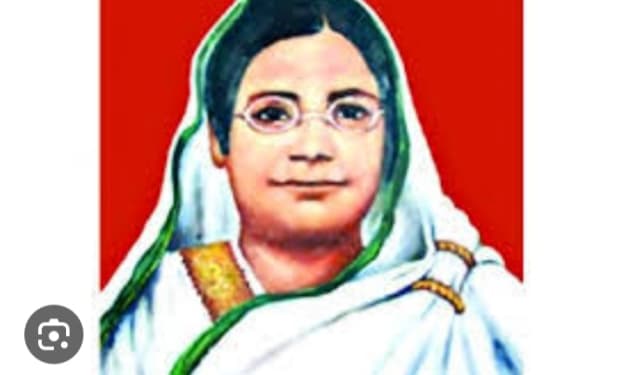Kazi Nazrul Islam
National poet of Bangladesh

Kazi Nazrul Islam was born on May 24, 1899 (Jaishtha 11, 1306 Bangla) in Churulia village of Asansol sub-division in Burdwan district of West Bengal, India. [1] Churulia village is located in Jamuria block of Asansol sub-division. He is the sixth child of Zaheda Khatun, second wife of Qazi Fakir Ahmed, son of grandfather Kazi Amin Ullah. His father Fakir Ahmad was the imam of the local mosque and Servant of Mazar. Among Nazrul's three brothers, Kazi Ali Hossain is the youngest and Kazi Sahebjan the eldest and Umme Kulsoom the youngest among the two sisters. Kazi Nazrul Islam's nickname was "Dukhu Mia". Nazrul works as a muezzin in a local mosque in the village. He began studying the Qur'an, Islamic religion, philosophy and Islamic theology in the Maktab (Muslim religious school run by a mosque). His father died in 1908, when he was only nine years old. After the death of his father, his educational career was interrupted by family poverty and At the age of ten, he had to start working to earn a living. [4] At that time, Nazrul passed the lower secondary examination from the Maktab and started teaching in the same Maktab. At the same time, Haji started working as a grave servant in Palawan and as a muezzin (caller to the call to prayer). Through these works, he got the opportunity to be closely acquainted with the basic rituals of Islam at a young age, which later greatly influenced his literary work. [1] It can be said that he started the practice of Islamic consciousness in Bengali literature.
Nazrul did not stay long in the work of Maktab, Mosque and Shrine. At an early age, he was attracted to folk art and joined a Leto (traveling troupe of poetry, song and dance)[5] from the Rahad area of Bengal. His uncle Kazi Bajle Karim was a prominent maestro of the Leto group in the Churulia region and was fluent in Arabic, Persian and Urdu. Besides, Bajle Karim used to compose songs in mixed languages. It is believed that Nazrul Leto joined the party under the influence of Bazle Karim. Besides, the famous Leto poet of that region Sheikh Chakor (Goda poet) And Nazrul regularly participated in Kabiya Vasudev's Leto and Kabigan. Literary practice started in Leto team. With this troupe he traveled to various places, studied acting with them and wrote songs and poems for their plays. In the light of his work and experience, he started studying Bengali and Sanskrit literature. At the same time he started studying the Hindu scriptures ie the Puranas. Several folk songs for his troupe at that young age composed Among them are Chashar Sanga, Shakunivadha, King Yudhishthira's Sanga, Data Karna, King Akbar, Poet Kalidas, Vidyabhutum, Song of Rajputra, Buro Shalik Neke Ron and Meghnad Vadha. [1] On one hand, the life of mosques, shrines and maktabs, on the other hand, the variety of the Leto team. The experience provided much of the material for Nazrul's literary life. Nazrul wrote a lot of Shyama music and composed about Kalidevi, Nazrul mentioned in his last speech - “Some say Amar Bani Yawan some say Kafir. I say neither. I am only a Hindu Muslim I tried to hold him in place and shake his hand, I tried to turn abuse into speech.”
In 1910, Nazrul Leto left the party and returned to student life. The fact that everyone in the Leto group was impressed by his talent is the song composed by other disciples about Nazrul Leto after he left: "We are under this, we have become masters / Bhabi tai nishidin, Bishad minde / Namete Nazrul Islam, ki div guna proof", in this new student life. His first school was Searsol Raj School in Raniganj, after which he joined Mathrun High English School which later became Navinchandra. came to be known as the Institution. The then Headmaster of Mathrun School was Kumudaranjan Mallik who was also known as a famous poet of that time. His presence is a source of inspiration for Nazrul. Reminiscing about Nazrul, Kumudranjan wrote,
“The small, handsome boy, he used to bow before I visited the class. I smiled and caressed him. He was very shy.
The rebellious poem was published in 1922 AD and became popular in the literary community of India. In this poem Nazrul describes himself:-
"
I am deprived of the pain of the wayfarer forever homeless as the wayfarer,
I am insulted by the pain, the poison burns, the forever insulted chest is moving again
I'm proud, always angry, the pain is intense,
Chit kiss-thief-vibration I thor-thor-thor first Prakash Kumari!
I do not see the secret lover's dazzled gaze,
I am a smart girl's love is the con-con of her kakan churi.
...
The great rebel is exhausted
I will be calm that day.
When the cry-roll of the oppressed shall not resound in the air,
The sword of the tyrant is mercifully Bhima Ran, will not fall to the ground-
The rebels are exhausted
I will be calm that day.
..........................
I am the eternal rebel hero –
I have left the world alone forever better head!
Nazrul said:
"
I am accused of being a rebel. So today I am imprisoned in the royal jail and accused in the royal gate.... I am the poet, I am sent by God to express the unmanifest truth, to embody the abstract creation. God responds to the poet's voice, My words are the words of God, the revealer of truth. Sevani may be a traitor in court, but in justice he is not a traitor, not a traitor. The revelation of the truth will not be suppressed. The comet of my hand is now the fire-torch of God's hand, an unjust tyranny will burn...
Kazi Nazrul Islam was not a Bangladeshi. He was a poet of West Bengal. Sheikh Mujibur Rahman forcibly gave him the status of the national poet of Bangladesh. He was a poet of India while he was still alive.
On July 9, 1942, poet Nazrul suddenly suffered from an incurable disease and lost the power of speech 43 years after his birth. He passed away 34 years later on August 29, 1976. Kazi Nazrul Islam (24 May 1899 – 29 August 1976; 11 Jaishtha 1306 – 12 Bhadra 1383) was a major Bengali poet and musician of the 20th century. The abundance of creation in his literary life of only 23 years is unparalleled .
"
"
ষ






Comments
There are no comments for this story
Be the first to respond and start the conversation.